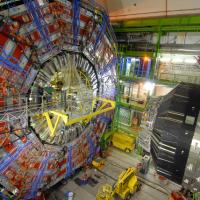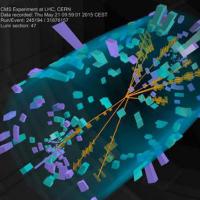A group of physicists from the National Research Nuclear University takes an active part in the development of calibration procedures and software for hadronic calorimeter.
CMS is one of two universal detectors operating in the world's largest accelerator – Large Hadron Collider (LHC). Although the experiment’s name stands Compact Muon Solenoid, actually it is a huge and complex detector.
Approximately 4 thousand scientists, engineers and students from 182 universities from 42 countries work at this detector. Its main scientific aim is a study of properties of the Higgs boson and search for phenomena which are beyond the modern theory of elementary particles, which is called “Standard Model”. Large efforts are made to find so-called Supersymmetric particles, predicted by Yu. Golfand and E. Lichtman at the Lebedev Physical Institute of the Russian Academy of Sciences in 1970. Also they search for extra dimensions of space and for dark matter.
CMS is not only a factory of first-class scientific results, but also a real source of highly qualified personnel. The CMS employs approximately 1,500 postgraduate and undergraduate students. It is an integration of science and education which became the main motivation for MEPhI to join CMS.
Additionally, CMS starts using SiPM – revolutionary new photo detectors developed in Russia with a large participation of physicists from MEPhI under the guidance of Professor B. A. Dolgoshein. Department №7 was a key contributor to the creation of the first physical device with large-scale use of SiPM (8 thousand) – a calorimeter of CALICE collaboration. It should be noted that recently the concept of the CALICE calorimeter was taken as a basis for modernization of a front CMS calorimeter. MEPhI scientists have already involved in the development of this detector and will participate in its creation. Evidence of their contribution resulted in the invitation of MEPhI employee to report on the radiation resistance of elements of this detector at the international conference.
The staff of the Institute is actively engaged in calibration of the existing calorimeter. Calibration of a hadron calorimeter is carried out regularly during the experiment. It includes verification of a homogeneity of a detector response and determination of an absolute energy scale, which is crucial for subsequent physical analysis. Calibration coefficients are continuously updated as the data is collected. The group from MEPhI is actively involved in the development of calibration procedures and software. Also they are involved in the study of properties of heavy quarks and a search for new phenomena. So while it’s not a year as MEPhI is involved in CMS (since 06.09.2014), its group has already been actively engaged in the experiment.
Now it’s moment when an interesting time starts. After LHC upgrading its energy has been increased almost twice to 13 TeV. It will stimulate cognition of matter structure.
The figure shows one of the first events registered in the CMS with a record energy.







